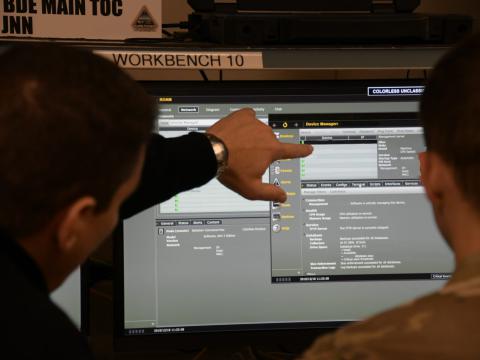DISA Leader Reveals His Thinking About the Agency's Future
Top Defense Information Systems Agency officials met with industry today to share their strategy and plans for the future.
Top Defense Information Systems Agency (DISA) officials met with industry today to share their strategy and plans for the future. Lt. Gen. Carroll F. Pollett, USA, director, DISA told attendees at the Forecast to Industry Day that the agency is looking to the commercial sector to engage with DISA's leaders and help shape the future. Although he is considering developments in the short term-four to five years-he is especially focused on where the military and the United States will be 10 years from now as he makes plans and fills current requirements.
Technology alone is not DISA's primary concern, Gen. Pollett said. With a vision of "Leaders Enabling Information Dominance in Defense of our Nation," the agency's focus is on how to deliver capabilities to the warfighter more efficiently and effectively. Commanders aren't concerned with how a capability is delivered, he pointed out, they just want the capability at their disposal when they need it. The difference in bringing command and control, infrastructure and information assurance to the edge in today's environment is that the edge is everywhere in irregular warfare, he said. The general emphasized that he is not interested in proprietary solutions.
This strategy will require resources-both in funding and personnel, he noted. "You can have dreams and visions, but without resources, all you have are dreams and visions," the general stated. Some of his concerns include retaining intellectual capital when the agency moves its headquarters from Arlington, Virginia, to Fort Meade, Maryland, as a result of the Base Realignment and Closure decision. To address this issue, DISA's leaders are reviewing what skill sets are needed, which may result in retraining and shifting personnel, he explained.
The general has spoken with the combatant commanders of nearly all of the combatant commands and the leaders of each of the services to improve his understanding of their requirements. These meetings also contributed to an understanding of how DISA can leverage its relationship with the commercial sector. However, DISA is not making a to-do list as it has in the past. Instead, it is creating a living document that can be changed over time, he added.
"What will we do next?" he asked rhetorically. "That's where my focus is. What am I doing so international coalitions, national-level leaders and warfighters have capabilities? How do we partner with industry to accomplish this?" He agreed that the partnership announced yesterday between the General Services Administration and DISA will result in greater efficiencies, improved processes, more capabilities to the warfighter, "and if we're lucky, we'll save some money in the process," the general said.
In addition to DISA partnering with industry, Gen. Pollett said the agency also needs companies to partner with each other to develop enterprise solutions.


